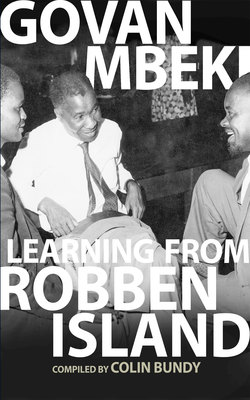Читать книгу Learning from Robben Island - Govan Mbeki - Страница 7
На сайте Литреса книга снята с продажи.
Comrade Moses Mabida:
In Memoriam
ОглавлениеCOMRADE MOSES MABIDA: HIS ORIGINS
In paying our last respects in memoriam to Comrade Moses, it is well to remember that it is not the amount of words we say here that will measure the depth of our feelings at the loss to the liberation struggle of the peoples of our land. His life and struggles are an open book for all to read and evaluate.
Often we walk along the pavement, stop at a display window and admire a beautifully tailored woollen suit – a finished product. It never occurs to us at that moment that the finished product is made from the wool shorn from a sheep, leaving it exposed to all the weather changes.
Comrade Moses was born and brought up in his early years in a small peri-urban location which, for all practical purposes, borders on peasant areas outside Maritzburg. Look at the lifeless, uninspiring conditions in which the children born and bred there live. Look at the drab surroundings into which the children of our oppressed peoples were born and reared: the slum conditions of our ugly townships in the urban areas. But the weight of such squalor and oppression has not overwhelmed them. They have risen to stake their rightful claim to their birthright: Inkululeko, Tokololo, Vryheid, Freedom.
And Comrade Moses emerged from their ranks and they elevated him to the highest positions to lead them.
Comrade Moses – the secretary of the working class party, the CP. Comrade Moses – a member of the National Executive of the ANC – the spearhead of the struggle for national liberation.
COMRADE MOSES: THE MAN
Comrade Moses Mbeki Mabida will long be remembered by those who knew him personally. He was modest and unassuming in his daily relations with those who came his way. I don’t know how much his teacher at school – Comrade Henry Gwala – contributed towards his quality which endeared Comrade Moses to all who met him. At almost all the Organisation’s meetings Comrade Moses was a delight to listen to when interpreting from English to Zulu. Invariably he improved on the English version.
COMRADE MOSES: IN ACTION
His public life started at an early age when he was still a student. He joined the CP and the ANC. After leaving school he became an organiser of the Transport Workers’ Union in Maritzburg. During the early 1950s he moved to Durban where he became the secretary of the Railway Workers’ Union until he left the country in 1960. In Durban he rose to the provincial executive of the ANC where he worked very closely with Chief A.J. Luthuli, then President-General.
By the end of the 1950s the ANC had mounted, through its anti-government campaigns, such tremendous pressures that the National Party government blundered into a declaration of a state of emergency. A strange and happy coincidence took place. On the day the police swooped on the leading members, Comrade Moses had gone to Maritzburg and managed to escape arrest. Up north, as Comrade Wilton Mkwayi left the Treason Trial court, he saw police standing at the door of their transport. He asked: “What’s going on here?” A policeman threatened to arrest him for “obstruction”. He apologised and the policeman ordered him to go away, and so he escaped detention under the Emergency. The government has lived to rue the day these two trade unionists were not drawn into the police dragnet. SACTU [the South African Congress of Trade Unions] lost no time in sending them overseas to establish a mission at the headquarters of the World Federation of Trade Unions.
During the years that Comrade Moses headed this mission abroad, it carried out a campaign to draw the attention of the world’s organised working class to the plight of the black working class in South Africa. Comrade Moses soon gained the respect and confidence of those with whom he came into contact. At international conferences the delegates from Africa always elected him to be the spokesman for Africa. The combined campaigns on various international fronts by the ANC, SACTU and the CP have ripened into today’s international pressures to destroy apartheid.
COMRADE MOSES: THE LASTING LESSON HE TAUGHT US
The problems created by legalised racism, the institutionalised separateness between blacks and whites in South Africa, are not often well appreciated. The fact that over the years each of the four main racial groups has built up its own organisation purporting to advance its own interests has kept apart groups that should have been bound together to fight the common enemy. This problem has spilled over even into the CP, which has been non-racial throughout the years. Some of its members are white and enjoy all the privileges of whites while the black members suffer all the hardships of oppression and special exploitation.
It has been the task of the members of the CP, especially the black members, to lay bare the tricks of the oppressors and themselves be a living example of how a member of the CP can work in the national liberation organisation in a manner that inspires confidence and trust. It was on this absolute trust between the ANC and the CP that these two organisations have built the alliance that has shaken the very foundations of apartheid, and the National Party government is today fighting for its very survival.
To his very last breath Comrade Moses has been foremost in bringing about the successes we see today.
Let us take up the lesson and accomplish what he has taught us.
Our condolences go to his family.
[Moses Mabida died on 8 March 1986]
